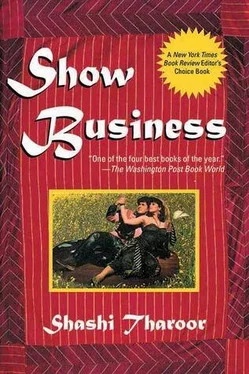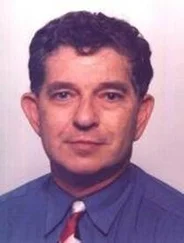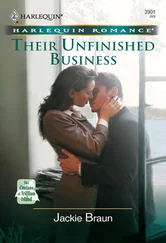Not anyone, he retorts, looking exasperated. Only you.
It happens so fast I can barely see the blur. Like one of Mohanlal’s simpleminded directional techniques that shows the passage of time by the pages on a wall calendar flipping rapidly through the dates. One moment I am basking in my newfound regular access to the Prime Minister’s office, the next an enterprising newspaper has found (or been leaked) evidence of a commission that was never supposed to have been paid. Documents start being circulated in Parliament. Dr. Gangoolie is expelled from the party and denounces its ideological direction to explain his departure. The investigation is stepped up by a self-righteous minister; Switzerland starts being mentioned. An account labeled Gypsy is unearthed, to the delight of amateur translators and travel agents. Maya’s shopping trips to Harrod’s are alluded to on the front pages. The PM’s supporters in the party attack the investigation. The minister threatens to resign rather than drop his inquiries. Fingers are pointed at me; two-bit journalists start compiling dossiers on my visits to Geneva. MPs step aside as I walk toward them in the Central Hall of Parliament. The whispers mount. The Prime Minister truthfully denies ever having met me since my election. Voters in my constituency are interviewed and quoted as saying that they have not seen my face there since the voting tallies were declared. (True, but dammit, wasn’t I supposed to be in Delhi?) A syndicated columnist suggests that I was brought into the party because of my film world connections with smugglers, black marketeers, and foreign exchange violators. No Hindi film hero has been more rapidly reduced to unproven villainy.
I am still in shock from these attacks, but what really breaks me is the defense. I know the government will not expose my involvement, because they cannot do so without betraying themselves. But the way they choose to protect me! The Prime Minister lets it be known he has not so much as spoken to me in months. An anonymous, highly placed government source tells another columnist that if I were of any importance to the party I would have been better employed than on the back benches; therefore I am obviously a politician of no consequence who couldn’t possibly have any connection to a major national transaction. “Ashok Banjara was brought into politics to win a seat, not to run the affairs of government,” a party spokesman with hair coming out of his ears bluntly tells a journalist with steam coming out of hers. A government-appointed inquiry fails to establish any connection between me (or anyone else in the party, not even, so to say, Dr. Gangoolie) and the published documents. The recalcitrant minister, who has meanwhile been kicked upstairs to a more prestigious portfolio, denounces the inquiry as “a whitewash of black money” and leaves to set up his own party.
Legally I am in the clear; my exoneration, though, is based upon the absolute reiteration of my irrelevance. There will be no criminal charges against me, but politically I am as finished as a cabaret dancer on crutches.
There really is only one thing to do. I quit.
No one has to ask me to do it. All it takes is one conversation with my brother. “Its all gone, Ashok,” he says with finality. “All gone. And you don’t even know why. You don’t even understand what the game was, whose interests you were serving, who set you up, who rode you to a fall, why. It was just another part in a story you thought you didn’t need to understand. But on this shift, Ashok-bhai, somebody gave you the wrong lines.”
“I know, Ashwin,” I admit glumly. “Tell me what it was about.”
“What is there to tell?” Ashwin is both depressed and dismissive. “You were taken for a ride, that’s all.”
“But what about all the stuff Dr. Gangoolie told me? What did it mean?”
“That? Oh, that,” Ashwin says. “That was done with the political equivalent of reflectors, playback, dubbing. That was all show business.”
What can I say to that? I resign from Parliament and announce that, for personal reasons, primarily that of being saddened and disgusted by the vilification to which I have been unjustly subjected, I am also leaving politics for good. Because I ask Ashwin to look over the text of the statement, he puts in a sentence of thanks to the voters of my constituency for having elected me. Before my announcement reaches the newspapers, Pandit Sugriva Sharma declares his renewed candidacy for the seat.
In their relief at being spared the embarrassment of having to defend me, the party tries to negotiate a deal with the Pandit. They will put up a weak candidate, in effect letting him have the seat, provided he confines his electoral attacks to me rather than the party. Confidently, he spurns them. Our ex-minister endorses Sugriva Sharma’s candidacy. His victory is a foregone conclusion. Even then, Dad and Ashwin are asked to stay away from the constituency during the by-election.
I have, as our Hindi film dialogists say, rubbed the honor of the Banjaras in the mud. I decide to leave Delhi. But I have to say good-bye to my brother. Good-bye, and farewell: I want him to fare well.
I walk into the house on the way to the airport. My mother’s face is impossible to read when I tell her of my decision. “Jeete raho, bete’ is all she can say. May you go on living, my son. The same traditional blessing she had given me when I first set out for Bollywood. I had not found the words encouraging then; I do not find them discouraging now.
Ashwin isn’t home. She doesn’t know when he’ll be back. “I’m sorry I can’t wait, Ma,” I say. “Tell him I wanted to say goodbye. I’ll telephone him from Bombay.” I hear the clatter of a cane and the shuffle of tired feet at the entrance to the room. Even before I look I know who it is, though I hadn’t known Dad had started using a cane. I want to reach out to him. He stands in the doorway a shrunken man, his face gaunt and lined, a shambling figure far removed from the towering personality I have always sought to escape.
“So you’re leaving,” he says. His voice is hoarse, echoing a fraying hollowness within. I nod soundlessly. I would like to say something more — “sorry,” perhaps, “sorry, Dad.” I haven’t called him “Dad” in ages. But no words come.
“Leaving. Escaping. Running away. As always.” He leans on his cane, each utterance emerging in an angry rasp. “Why?” He spits out the question.
“There’s nothing left for me to do here.” I am shaken, made defensive by the unexpectedness of his rage.
“There never was anything for you to do here.” The bitterness flies out of his mouth like spittle. “And once I had such high hopes for you. My— son.” His voice breaks slightly at the lost possibilities of the word. “Why?” he resumes, his cane smashing at the door-jamb. “What for? What was the point of it all?”
“KB,” Ma says, “you’re shouting.”
“I know I’m shouting!” He turns to me and I realize that not even in my childhood have I seen him so angry. “Go! Go to your films and your sluts and your dancing and kicking! Go — go and destroy something else!”
“Dad—”
“Don’t say another word!” And I see, to my horror and disbelief, that he has raised his cane and is holding it as if he is about to strike. “KB!” My mother’s alarm is genuine. Quickly she goes to him and gently lowers his arm. They both look at me, and I am lacerated by the jagged edges of pain in their eyes.
There is nothing I can say to them. I leave the house without another word.
“I wasn’t enjoying it anyway,” I say to Cyrus, whose nephew has been turned down by the Planning Commission. “But one thing I’ll never forgive the bastards for: they froze the Gypsy account, into which the commission had been paid, without warning me to get my own money out first. Cyrus, I’m practically broke.”
Читать дальше












